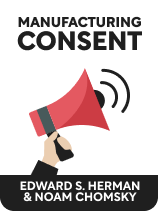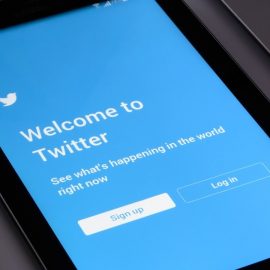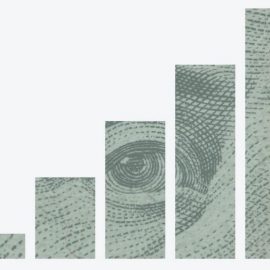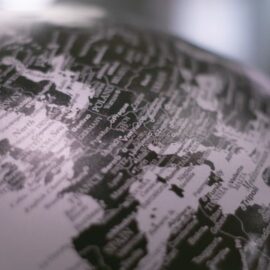

This article is an excerpt from the Shortform book guide to "Manufacturing Consent" by Edward S. Herman and Noam Chomsky. Shortform has the world's best summaries and analyses of books you should be reading.
Like this article? Sign up for a free trial here .
Is there news censorship in America? What indirect censorship tactics do the elite use to influence big media outlets?
Despite the supposed “freedom of the press,” the government and big corporations control what the general public sees in the news. They’re able to skirt censorship laws by using suppression and intimidation techniques.
Here are the five most common tactics used to censor the media in America.
The Suppression of Adversarial Media
The authors of the book Manufacturing Consent argue that news censorship in America is very present. They explain that powerful government and corporate figures have multiple tactics at their disposal to discredit, harass, intimidate, and, ultimately, suppress media outlets and individual journalists that threaten them.
Tactic #1: Cutting Off Access
Chomsky and Herman write that when media outlets or individual reporters produce coverage that portrays powerful institutions or individuals in a positive light, they’re rewarded with more access—scoops, credentials to press conferences, soundbites, and exclusive interviews. This gives these journalists a competitive advantage over their rivals.
Likewise, powerful institutions and individuals can punish media sources they dislike by cutting off their access to exclusive content, allowing them to be scooped by their rivals. For example, in 2017, Trump administration press secretary Sean Spicer barred multiple mainstream news outlets from White House press briefings, citing what he deemed as unfavorable and biased coverage against the administration. The barred outlets included the New York Times, Politico, CNN, BuzzFeed, the BBC, and the Daily Mail. Spicer instead allowed exclusive access to conservative media sources that he viewed as more favorable to Trump.
| Can the Media Deny Powerful Politicians a Platform? Chomsky and Herman argue that powerful politicians can use the media’s near-insatiable demand for scoops and exclusives against it by providing them only to outlets that offer favorable coverage. But what they don’t say is that the media can also do the same thing—deny a forum or platform to politicians it dislikes, distrusts, or whose claims it believes to be extreme, dangerous, or unfounded. After Donald Trump began vocally calling into question the integrity of the 2020 election and lobbing baseless claims of fraud during White House press briefings, major networks such as CBS, NBC, MSNBC, and ABC took the extraordinary step of cutting away from his live briefing and fact-checking his claims in real-time. |
Tactic #2: Withholding Advertising Revenue
Powerful and wealthy corporations can use their financial clout to bring recalcitrant media to heel by refusing to buy advertising. Since the business model for most media companies relies heavily on advertising revenue, companies that act in concert and refuse to purchase ads in certain print, broadcast, or digital outlets can have a significant effect on an outlet’s finances.
The authors argue that this type of coordinated action denies media outlets a crucial source of income and makes it more likely that they’ll alter the tone and content of their coverage to win their advertisers back.
| Did the Facebook Ad Boycott Have Any Effect? Despite the claims of the authors, some commentators assert that ad boycotts are generally ineffective at changing how media outlets operate. In 2020, the civil rights group #StopHateForProfit organized an advertiser boycott against Facebook in response to what they saw as the company’s failure to stop the spread of hate speech and fake news across its platform. Over 1,000 companies publicly participated in the boycott. During this time, Facebook’s top 100 advertisers—including major public companies like Procter & Gamble, Samsung, Walmart, and Geico—significantly pulled back their spending on the platform, collectively spending $30 million less in ads than they had the year before. Despite the financial hit to Facebook, however, the dip in advertiser spending seems to have done little to damage the tech giant in the long term, as most of the companies that participated in the boycott signaled their intention to resume purchasing Facebook ads by August 2020. However, it could be argued that the boycott—despite its limited financial impact on Facebook—did succeed in compelling the company to change some of its practices. Partly in response to the pressure campaign, Facebook worked with the Global Alliance for Responsible Media to produce an independent audit which found that the company’s decisions and policies created an online environment where hate and misinformation could flourish. The company also announced the hiring of a civil rights executive—although critics derided this move as spin and an attempt to put window dressing on what they saw as the toxic culture and business practices of Facebook. |
Tactic #3: Regulatory Action and Intimidation
Chomsky and Herman write that politicians who dislike the coverage they get from certain platforms (often because they think it is partial to their political rivals), can use their direct regulatory and investigative power to harass and intimidate those media outlets. For example, Rodrigo Duterte, president of the Philippines has used hardball tactics to silence and intimidate journalists. One online media outlet, Rappler, has been banned from participating in press conferences, while its journalists have been subjected to death and rape threats by Duterte-aligned social-media users. At the same time, the company has been selectively targeted by state prosecutors on trumped-up financial charges.
| The Bipartisan Case for Regulating Facebook Unlike Chomsky and Herman, some argue that better regulation of powerful media platforms can serve the public good. The subject of state regulation of media has been a hot topic in the United States, with prominent politicians from both major political parties calling for increased regulation of content on social media platforms like Facebook. On the Republican side, conservative populists like Senator Josh Hawley of Missouri have argued that Facebook is a dangerous monopoly that should be broken up using the federal government’s antitrust enforcement powers because it silences conservative voices. On the Democratic side, meanwhile, President Joe Biden supports the repeal of Section 230 of the Communication Decency Act of 1996, which protects sites like Twitter and Facebook from liability for any content published by users on their platforms. Biden argues that Section 230 has enabled social media platforms to become havens for misinformation on topics from Covid-19 to election fraud that pose a serious threat to the country’s general welfare. He asserts that the law should be changed to make these companies liable for false, defamatory, and violent content posted by their users. |
Tactic #4: Silencing Through Litigation
The authors argue that deep-pocketed interests and individuals can use the legal system to shut down non-compliant or adversarial media. They often do this by initiating litigation (often on frivolous libel or defamation grounds) against the targeted media outlet.
Chomsky and Herman note that, technically, in the United States, the media has broad legal protection from criminal liability for what it writes or broadcasts (particularly with regard to public figures and government officials) under the First Amendment. But, they observe, this does not always shield it from private civil litigation. Thus, a billionaire who holds a vendetta against a particular media outlet can initiate legal action against it. Even if the billionaire doesn’t prevail in court, they can sometimes succeed in financially destroying the targeted media platform by forcing it to pay exorbitant legal fees just to defend itself.
Perhaps the most well-known example of this phenomenon is the financial destruction of Gawker, a gossip blog, by PayPal billionaire Peter Thiel. Thiel was outraged when, in 2007, Gawker published an article outing him as gay. In response, Thiel spent $10 million to bankroll a third-party lawsuit against Gawker brought by former professional wrestler Hulk Hogan, who alleged that Gawker had libeled him when it posted his sex tape without his consent.
In 2016, a jury in Florida sided with Hogan and awarded him a $140 million judgment. The ruling bankrupted Gawker and forced it to shut down. Some commentators argue that the results of this episode could have a chilling effect on media coverage of powerful Silicon Valley figures for years to come.
| The Abuse of English Libel Law Some think tanks have argued that libel laws in the UK—and in England in particular—pose a serious threat to the practice of free journalism.In most jurisdictions around the world, the burden of proof for libel is with the plaintiff, who must prove in court that the defendant intentionally published false and malicious statements that harmed their reputation. But under English law, the burden of proof for libel lies with the defendant, who must prove that their published statement is true. In fact, for a plaintiff to win a libel suit in England, they don’t even need to prove that the defendant’s statement was false—merely that it harmed their reputation. This creates an uneven playing field in English libel cases, one that gives an inherent advantage to powerful and wealthy interests who wish to intimidate or silence journalists. One study showed that journalists and publishers faced more lawsuits and threats of court action from the UK than from all other European countries and the United States combined. Perhaps most worryingly, journalists and publishers don’t even have to be British citizens to be sued there—as long as there is some connection to the UK, however tenuous (as would be the case, for example, with any published piece of digital content available to users in the country), media outlets are vulnerable to potentially ruinous litigation. In recent years, publishers from Bosnia, Cyprus, Malta, South Africa, and Angola have all been threatened with litigation in London. |
Tactic #5: Funding Anti-Media Organizations
On a more extreme level, note the authors, wealthy and powerful interests can use their economic resources to fund anti-media organizations. Such organizations are primarily—although not exclusively—associated with the political right and are designed to discredit and intimidate mainstream media.
For example, Project Veritas, founded by conservative provocateur James O’Keefe, is well-known for its tactics of using undercover sting operations and “gotcha” videos (often recorded without the subjects’ consent and later deceptively edited) to expose what it sees as left-wing bias in mainstream media outlets like CNN and NPR. Notably, Project Veritas has received significant funding from Donors Trust (a donor-advised fund used to coordinate the political spending of the conservative Koch family) as well as the Donald J. Trump Foundation.
| Fox News and Alternative Reality Some media commentators have argued that conservative cable news network Fox News is the living embodiment of the kind of anti-media organization described by Chomsky and Herman. Writing in 1988, the authors warned of (primarily right-leaning) organizations that existed to discredit or harass mainstream media organizations. But it would have been difficult for them to foresee the reach and power of Fox News—an outlet that many argue functions as a form of alternative reality for its viewers, allowing them to forego mainstream media and established facts altogether and replace them with a worldview shaped by propaganda. Further, some analysis suggests that the alternative reality created by Fox has major impacts on events in the “real” world. One 2006 paper argued that the Republican Party benefited substantially from the debut of Fox News in U.S. cable markets in October of 1996. According to the data, the GOP gained between 0.4 and 0.7 percentage points in its share of the presidential vote between 1996 and 2000 in towns and cities where Fox News was available. They further calculate that the cable news outlet persuaded between 3% and 28% of its total audience to vote Republican. Given the incredibly close margins in the 2000 presidential election, this would indicate that George W. Bush owed his victory in the state of Florida (and thus, the election) to Fox News. |

———End of Preview———
Like what you just read? Read the rest of the world's best book summary and analysis of Edward S. Herman and Noam Chomsky's "Manufacturing Consent" at Shortform .
Here's what you'll find in our full Manufacturing Consent summary :
- How the American media frames events and creates narratives that serve the elite
- How elites indirectly censor media and avoid censorship laws
- Why corporate media outlets value profit above truth or news value






